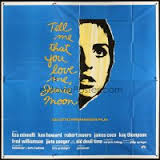
TELL ME THAT YOU LOVE ME, JUNIE MOON
US, 1969, 108 minutes, Colour.
Liza Minnelli, Ken Howard, Robert Moore, Ben Piazza, James Coco, Anne Revere.
Directed by Otto Preminger.
Tell Me that You Love Me, Junie Moon is based on a novel by Marjorie Kellog who wrote the screenplay. It has, in turn, been praised and hated by critics. The film studies three physical and social misfits and should have called for audience sympathy and understanding. but the result is too frequently a garish and breathless rush at significant drama. The fault of the film does not lie with the actors, and their work makes the film worth seeing. Liza Minnelli is good as the scarred Junie Moon, a shallow good-time girl, whose facial disfigurement changes her life and gives her an opportunity to develop her character and her generosity. Ken Howard is a gentle epileptic from an orphanage. Robert Moore is an irritating and catty homosexual cripple from a rather bizarre and loosely moralled background. Together they set up a home and try to reach some kind of working normality.
Preminger uses technical gimmicks to illustrate his characters' past -long narrative for Junie Moon's acid scars; sudden memory flashes for the cripple; elongated screen fantasies for the epileptic. The film is seriously marred at the end with a preposterous confidence trick holiday for the three and a sentimental love and death ending. Solutions
are open to moral questioning as well. Many moving moments make a disappointing film worth consideration. The director is a man of spectacle and lavish dimensions - Exodus, The Cardinal, In Harm's Way.
1. Are you satisfied with the cinema treatment of the struggles for the three misfits? Does the film's tone seem appropriate?
2. What is the relevance of Pete Seeger's singing 'Old Devil Time' as a framework for the film? His walk through the woods? The words of the song?
3. How do people become misfits and freaks? What do they contribute and what do people (e.g., suspicious neighbours) make them? How different are Miss Gregory and her neighbours?
4. Junie Moon - what kind of character was she before the incident? Admirable, ordinary or shallow (note her reaction to her mother)?
5. Was the cemetery scene convincing, and in good taste?
6. How did her character change after the incident? When she left hospital? Bitterness? Sense of responsibility? Giving and needing love?
7. Was she any better as a person for having suffered?
8. Arthur - discuss the strengths and weaknesses of his character, Diffidence, feelings, sensitivity, responsibility.
9. What effect did the type of flashback used have - Arthur in colour, everything else is elongated grey and black? Would the effect have been different if it were in plain narrative style?
10. Discuss his love for Junie. Was it real, or contrived by the screenplay? Was his death convincing, or did it seem artificial?
11. The cripple - his character. was it explained by his origins? Why was he so mean, petty, catty, nagging and self-centred? What were his attitudes to the dying negress, Giles, the black beach boy, Miss Gregory taunting him to walk? Did he achieve anything by the end of the film?
12. Mario - what was the effect of his kindness? The holiday - was it realistic or symbolic or a contrivance? The necessity of such a swindle (how funny was it)?
13. Were you satisfied at the end of the film? Would you have handled the story differently?